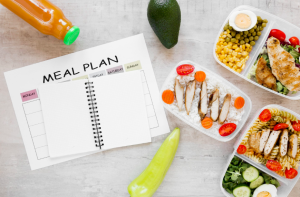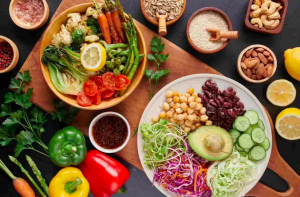
A Sustainable, Nutrient-Dense Meal Plan.

Creating a sustainable and nutrient-dense meal plan is one key to a healthy lifestyle. It provides essential nutrients to your body and reduces the negative impact on the environment. Sustainable food planning means creating food habits compatible with the environment and social context for the future.
Sustainable and nutrient-dense meal plan:
1. Basic concepts: Principles of sustainable and nutritious food

First, you need to understand the principles of sustainable and nutritious food. There are a few things to consider initially:
Nutritional balance:
Your diet should contain adequate protein, carbohydrates, fats, vitamins, and minerals.
Environmental Impact:
Choose foods that produce and transport less carbon emissions.
Local food:
Using local and seasonal food can reduce pressure on the environment.
Waste reduction:
Reduce food waste by preparing meals according to plan.
Hydration and Health: Why Water Matters.
2. Steps to a Diet Plan

To create a sustainable and nutrient-dense meal plan, you need to follow the right steps:
(1) Determine your nutritional needs

First of all, it is important to know what your daily calorie and nutrient needs are. This may vary depending on your age, gender, physical activity, and health status. An ideal meal plan can provide you with the right amount of protein, fat, carbohydrates, and other essential nutrients.
(2) Selection of durable materials
Include foods in your food list that are eco-friendly and readily available. For example:
Plant-based foods:
Vegetables, grains, and fruits are considered sustainable foods because they require less water and fewer resources to produce.
Local food:
Buying fruits and vegetables from local markets reduces transport pollution and also reduces food waste.
Plant-based proteins:
Using plant-based proteins such as lentils, soybeans, nuts, and seeds instead of animal-based proteins is less harmful to the environment.
(3) Give preference to seasonal foods

By eating seasonal foods, you will be in tune with the environment as well as maintaining physical fitness. Eating winter vegetables in winter and summer fruits in summer is environmentally friendly, as these foods require fewer resources to produce and are readily available locally.
(4) Create a balanced food menu

Include a variety of foods in your daily food menu so that your body can get the nutrients it needs. A sustainable meal plan can include the following:
- Breakfast:
Include oats, yogurt, fresh fruit, or nuts.
Lunch:
Choose a salad, lettuce, tomato, beans, or pulses. It can be supplemented with cereal or bread.
Dinner:
A portion of protein-rich food like vegetables, lentils, fish, or tofu will be healthy.
How sleep affects your physical and mental health.
3. Waste reduction and recycling

An important part of meal planning is reducing food waste. Some tips are as follows:
Cook the right amount:
Do not overcook. If there is excess food, save it and try to eat it the next day.
Using leftovers:
Vegetable peels or stems can be used to make soups or stocks.
Recycling and composting:
Unwanted parts of food can be composted as compostable waste, which increases soil fertility.
10 Nutritional Deficiencies You May Be Overlooking
4. Raising awareness about sustainable food

Meal planning is not only limited to the individual level but also has social and environmental responsibilities.
Support food producers:
By buying food directly from local farmers, you can support the environment and the local economy.
Choose organic food:
Eating chemical-free organic food reduces environmental pollution and maintains nutritional value.
10 Habits That Will Change Your Health.
5. For example, a week's meal plan

Monday:
- Breakfast:
Oats, almonds, and honey
- Lunch:
Shrimp or tofu salad
- Dinner:
Vegetable stew and red rice
Tuesday:
- Breakfast:
Fresh fruit and yogurt
- Lunch:
Brown rice and vegetable curry
- Dinner:
Lentil soup
Understanding the importance of regular medical checkups.
Conclusion
It's important to create a sustainable, nutrient-dense meal plan that provides your body with nutrients while minimizing the harmful impact on the environment. By prioritizing local, seasonal, and plant-based foods, reducing food waste, and planning meals with awareness, you can move toward a healthy and sustainable lifestyle.
Read More Articles
Instagram Twitter Facebook LinkedIn Quora Google News
Our Other Engagements:

 https://livewithgreen.com/a-sustainable-nutrient-dense-meal-plan/
https://livewithgreen.com/a-sustainable-nutrient-dense-meal-plan/
.jpg)